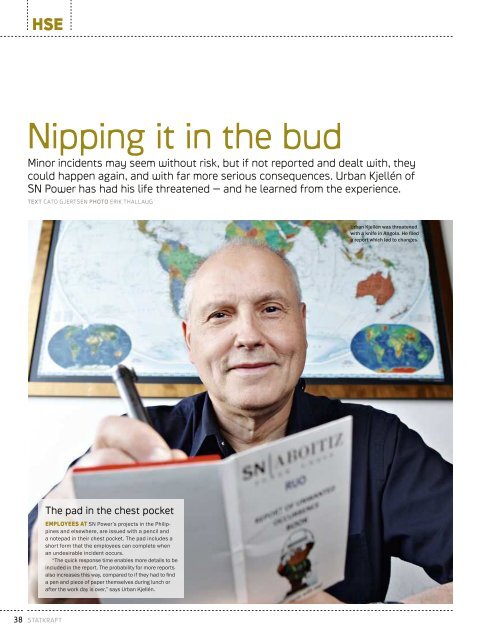You also want an ePaper? Increase the reach of your titles
YUMPU automatically turns print PDFs into web optimized ePapers that Google loves.
hse<br />
nipping it in the bud<br />
Minor incidents may seem without risk, but if not reported and dealt with, they<br />
could happen again, and with far more serious consequences. Urban Kjellén of<br />
sn power has had his life threatened – and he learned from the experience.<br />
tExt Cato gJertsen Photo eriK thaLLaUg<br />
38 StatKraft<br />
The pad in the chest pocket<br />
employees at SN Power’s projects inthe Philippines<br />
and elsewhere, are issued with apencil and<br />
anotepad in their chest pocket. The pad includes a<br />
short form that the employees can complete when<br />
an undesirable incident occurs.<br />
“The quick response time enablesmoredetails to be<br />
includedinthe report.The probabilityfor more reports<br />
also increasesthisway,comparedtoiftheyhad to find<br />
apen andpiece of paperthemselves duringlunch or<br />
after theworkday is over,”saysUrban Kjellén.<br />
UrbanKjellén wasthreatened<br />
withaknife in Angola.Hefiled<br />
areportwhich ledtochanges.<br />
Urban Kjellén was on assignment<br />
for aprevious<br />
employer in Luanda, Angola,<br />
when hewas stopped by<br />
aman who threatened his<br />
life with asharp weapon.<br />
Luckily, Kjellén escaped unharmed,<br />
but he took care to report the incident<br />
immediately. The result was achange inpolicy<br />
regarding how visitors were greeted and taken<br />
care of upon arrival in Luanda.<br />
increaseD attention<br />
Kjellén has brought this lesson with him to SN<br />
Power. He says there are two very important<br />
reasons why reporting all incidents atwork is<br />
so important. This applies even ifthe incident<br />
is without injuries topeople or damage to<br />
material assets.<br />
“It increases the awareness for danger signals<br />
with the individual employee,” says Kjellén. “You<br />
understand what a risk is, and the next similar<br />
incident could be far more serious. When employees<br />
report minor incidents, they are in fact<br />
training on applying a safety mentality. The other<br />
reason why reporting is so important is that it<br />
enables us to implement appropriate measures<br />
to avoid similar incidents in the future.”<br />
Unfortunately, in reality, some choose not to<br />
report minor incidents. There could be several<br />
reasons for this.<br />
Some do not see how serious the situation is,<br />
and think: “No harm done, why make a big fuss.”<br />
we attempttopromote<br />
aNorwegian culture<br />
with openness in this area,<br />
butittakes time.Sowehave<br />
to take baby steps. People<br />
need to understand whyit<br />
is importanttoreportminor<br />
incidents.<br />
UrBan KJeLLén<br />
The person in question suddenly finds themselves<br />
in a situation she or he should not be in.<br />
This could be because you have already bent<br />
the rules, and think it would be embarrassing or<br />
uncomfortable to report an incident that would<br />
shed light on your own undesirable involvement.<br />
Employees do not want to put their own supervisor<br />
in a bad light. There are clear hierarchies<br />
in many countries where SN Power operates. A<br />
regular employee often does not want to cause<br />
their supervisor to introduce measures that<br />
might cost money.<br />
quick response The last point may result<br />
in some employees reporting trivial issues,<br />
which then satisfies the supervisor’s reporting<br />
requirements, and the situation remains<br />
unchanged.<br />
“All reporting systems can be abused, even<br />
ours,” says Kjellén. “But our report reviews do<br />
not indicate that this is a problem. Our focus is<br />
on ensuring that reported incidents are followed<br />
up by measures, and that the person who made<br />
the report receives quick response so that the<br />
loop can be closed. There needs to be an accurate<br />
description of the incident, the causes<br />
why the incident occurred and the measures<br />
implemented to avoid it from happening again<br />
in the future. And it is of course important that<br />
the changes take place fairly quickly. The person<br />
who made the report must see that it was worth<br />
while, otherwise the motivation is gone”<br />
a moDest target SN Power’s goal isthat each<br />
employee attheir projects shall make at least<br />
one report annually. Kjellén does not shy away<br />
from this being aslightly unambitious target,<br />
but points out that there islittle point in taking<br />
an aggressive position in countries with authoritarian<br />
relationships between employees and<br />
management.<br />
“We attempt to promote a Norwegian culture<br />
with openness in this area, but it takes time,”<br />
says Kjellén. “So we have to take baby steps.<br />
People need to understand why it is important<br />
to report minor incidents. The next step will<br />
be to increase the target amount for reported<br />
incidents.”<br />
roUtines<br />
Changed<br />
aFter<br />
MUgging<br />
HSEbossReidun Pihl.<br />
“Must make verbal<br />
report too”<br />
rePOrTING<br />
reiDun pihl is the hse boss on the Hejre<br />
project for DONG E&P. Before that, she worked<br />
with HSE inNorsk Hydro for 31 years, and was<br />
hired asHSE director in India bySNPower in<br />
2009.<br />
She gives her complete support to Kjellén in<br />
his view of the importance of reporting incidents<br />
over time, although that could mean several very<br />
similar reports.<br />
“Reporting incidents, great and small, is<br />
an excellent tool in order to gain an overview,”<br />
says Pihl. “But just written reporting must never<br />
become an alternative to immediate pointing out<br />
to those involved once the incident has occurred.<br />
If not, there could be a repeat of the incident, and<br />
a more serious one at that, before you’ve had time<br />
to analyse the written report.”<br />
She has first hand experience with the challenges<br />
with reporting in cultures where losing<br />
face can overshadow the safety considerations<br />
of others. This applies in particular when the<br />
reported incident also includes a person higher up<br />
in the hierarchy.<br />
“It takes a lot of patience. An efficient approach<br />
is to start with contractors,” says Pihl. “This way<br />
you can illustrate the value of reporting, without<br />
your own colleagues feeling like ‘victims’ of the<br />
report.”<br />
And that makes reporting in the own organisation<br />
easier.<br />
PEoPlE & PowEr<br />
39

















